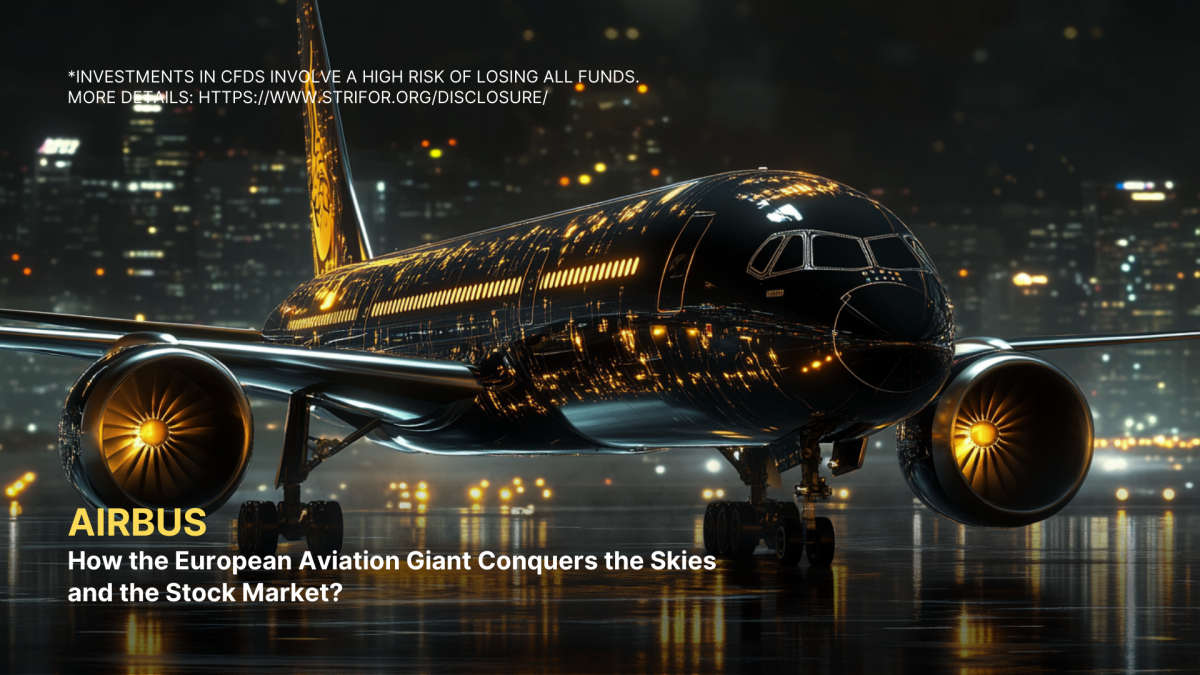
AIRBUS – How the European Aviation Giant Conquers the Skies and the Stock Market
Airbus is not just a company; it is a symbol of technological progress and European integration. Founded in 1970, it has become the main competitor of the American Boeing and today holds a leading position in the global aviation industry. Airbus shares are traded on 15 stock exchanges, including Euronext and the Frankfurt Stock Exchange, attracting the attention of both investors and traders. But what makes Airbus so unique? Let’s break it down in today’s Strifor review.
Success Story: From European Project to Global Leader
The Beginning
Airbus was created as a consortium of European aircraft manufacturers to compete with the market-dominating Boeing. The company’s first project was the Airbus A300—a wide-body aircraft that made its first flight in 1972. It was a bold move, as Boeing had almost monopolized the market at the time.
Key Development Stages
- 1980s: Launch of the Airbus A320, which became revolutionary due to the use of fly-by-wire (electronic flight control system). It was the first commercial aircraft with this technology.
- 1990s: Expansion of the model range and entry into the long-haul aircraft market with the Airbus A330 and A340.
- 2000s: Launch of the Airbus A380—the world’s largest passenger aircraft. Although the project faced challenges, it became a symbol of the company’s ambitions.
- 2010s: Success of the Airbus A320neo (a new generation of narrow-body aircraft) and the start of development for the Airbus A350—a competitor to the Boeing 787 Dreamliner.
Modern Era
Today, Airbus is not just an aircraft manufacturer but also a key player in the aerospace industry. The company produces helicopters, satellites, military equipment, and even participates in space programs.
Innovations That Changed Aviation
Fly-by-Wire
Airbus pioneered the use of electronic flight control systems, replacing traditional mechanical ones. This not only increased safety but also reduced aircraft weight, leading to fuel savings.
Efficiency and Sustainability
Modern Airbus models, such as the A320neo and A350, are equipped with engines that consume 15–20% less fuel compared to previous generations. This makes them attractive to airlines looking to reduce costs and carbon footprints.
Digitalization
Airbus actively implements digital technologies such as 3D printing of parts, artificial intelligence for predictive maintenance, and virtual reality for pilot training.
Economic Aspect: Why Is Airbus Interesting for Traders?
Going Public
Airbus became a publicly traded company in 2000 when its shares began trading on Euronext in Paris and the Frankfurt Stock Exchange. This allowed the company to attract additional funds for development.
Key Indicators
- Market Capitalization: Airbus has a market capitalization exceeding €110 billion.
- Revenue: In its latest quarterly report, the company’s revenue exceeded €15 billion.
- Orders: Airbus has an order backlog of over 7,000 aircraft, ensuring stability for years to come.
Volatility and Liquidity
Airbus shares (ticker: AIR) exhibit moderate volatility, making them attractive to both long-term investors and traders working with short-term price fluctuations.
Interesting Facts About Airbus
- The World’s Largest Aircraft: The Airbus A380 can accommodate up to 853 passengers in an all-economy configuration. Its wingspan is 79.8 meters—longer than the aircraft itself.
- Electric Aircraft: Airbus is developing the E-Fan X—a hybrid aircraft that could be the first step toward fully electric aviation.
- Space Ambitions: Airbus is involved in the ArianeGroup project, which develops launch vehicles for satellite deployment.
- Record Sales: The Airbus A320neo has become one of the most successful aircraft in history, with over 8,000 units sold as of 2023.
- Collaboration with NASA: Airbus is developing modules for the Lunar Gateway station, part of the Artemis program.
Why Is Airbus More Than Just an Aircraft Manufacturer?
Impact on the Aviation Industry
Airbus not only competes with Boeing but also sets new standards in aviation. Thanks to its innovations, the company has pushed the entire industry towards more efficient, sustainable, and safer aircraft. For example, the success of the Airbus A320neo forced Boeing to accelerate the development of the Boeing 737 MAX.
Global Presence
Airbus has manufacturing facilities in Europe, the USA, China, and other countries. This not only reduces dependence on a single region but also allows the company to be closer to its customers. For example, the plant in Mobile, Alabama, USA, produces aircraft for American airlines, helping to avoid trade barriers.
Social Responsibility
Airbus actively participates in carbon footprint reduction programs and supports sustainable development initiatives. The company has set an ambitious goal—to release the first fully eco-friendly hydrogen-powered aircraft by 2035.
Competitive Advantages of Airbus
Broad Product Range
Airbus offers aircraft for all market segments: from narrow-body A320s to long-haul A350s and cargo A330s. This allows the company to meet the needs of both low-cost airlines and premium carriers.
Technological Leadership
Airbus continues to invest in research and development. For example, the ZEROe project, aimed at creating zero-emission aircraft, could change the future of aviation.
Strong Support from the European Union
As a European company, Airbus receives significant support from EU governments. This includes research funding, tax incentives, and political backing in international disputes (such as the subsidy conflict with Boeing).
Summing Up
Airbus is not just a company; it is a symbol of technological progress and global competition. Its shares are of interest to both long-term investors and traders looking for stable assets with growth potential. And with Strifor, you can trade CFDs on Airbus shares and other major global companies on competitive terms. Join us – because we always pay!
Attention! An investment in CFDs carries the high risk of losing all investments funds. 87% of retail investor accounts lose money when trading CFDs with this provider. Past investment success does not mean future success.

 Personal area
Personal area





